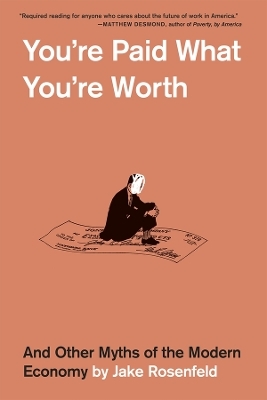
You’re Paid What You’re Worth
And Other Myths of the Modern Economy
Seiten
2024
Harvard University Press (Verlag)
9780674295483 (ISBN)
Harvard University Press (Verlag)
9780674295483 (ISBN)
Setting wages isn’t an exact science, but we like to think that our workplace performance provides an objective basis for pay. You’re Paid What You’re Worth offers a bold theory to the contrary, arguing that pay is decided in contests over interests and ideals—that social conflicts, not economic metrics, determine who gets how much.
“This is the book to throw at your human resources director—not literally, of course—when any attempt is being made to bamboozle you about how decisions on pay have been made…It is a closely argued, thoroughly researched treatise on how we got here and how pay could be both fairer and more effective as a reward.”
—Stefan Stern, Financial World
“A flat-out revelation of a book by one of the nation’s top scholars of the labor market…required reading for anyone who cares about the future of work in America.”
—Matthew Desmond, author of Poverty, by America
“Jake Rosenfeld pulls back the curtain on the multifaceted cultural, institutional, and market forces at play in wage-setting. This timely book illuminates the power dynamics and often arbitrary forces that have contributed to the egregious inequality in the U.S. labor market—and then lays out a clear blueprint for progressive change.”
—Thea Lee, President of the Economic Policy Institute
Job performance and where you work play a role in determining pay, but judgments of productivity and value are highly subjective. What makes a lawyer more valuable than a teacher? How do you measure the output of a police officer, a professor, or a reporter? Why, in the past few decades, did CEOs suddenly become hundreds of times more valuable than their employees? The answers lie not in objective criteria but in battles over interests and ideals.
Four dynamics are paramount: power, inertia, mimicry, and demands for equity. Power struggles legitimize pay for particular jobs, and organizational inertia makes that pay seem natural. Mimicry encourages employers to do what their peers are doing. And workers are on the lookout for practices that seem unfair. Jake Rosenfeld shows us how these dynamics play out in real-world settings, drawing on cutting-edge economics and original survey data, with an eye for compelling stories and revealing details.
You’re Paid What You’re Worth gets to the heart of that most basic of social questions: Who gets what and why?
“This is the book to throw at your human resources director—not literally, of course—when any attempt is being made to bamboozle you about how decisions on pay have been made…It is a closely argued, thoroughly researched treatise on how we got here and how pay could be both fairer and more effective as a reward.”
—Stefan Stern, Financial World
“A flat-out revelation of a book by one of the nation’s top scholars of the labor market…required reading for anyone who cares about the future of work in America.”
—Matthew Desmond, author of Poverty, by America
“Jake Rosenfeld pulls back the curtain on the multifaceted cultural, institutional, and market forces at play in wage-setting. This timely book illuminates the power dynamics and often arbitrary forces that have contributed to the egregious inequality in the U.S. labor market—and then lays out a clear blueprint for progressive change.”
—Thea Lee, President of the Economic Policy Institute
Job performance and where you work play a role in determining pay, but judgments of productivity and value are highly subjective. What makes a lawyer more valuable than a teacher? How do you measure the output of a police officer, a professor, or a reporter? Why, in the past few decades, did CEOs suddenly become hundreds of times more valuable than their employees? The answers lie not in objective criteria but in battles over interests and ideals.
Four dynamics are paramount: power, inertia, mimicry, and demands for equity. Power struggles legitimize pay for particular jobs, and organizational inertia makes that pay seem natural. Mimicry encourages employers to do what their peers are doing. And workers are on the lookout for practices that seem unfair. Jake Rosenfeld shows us how these dynamics play out in real-world settings, drawing on cutting-edge economics and original survey data, with an eye for compelling stories and revealing details.
You’re Paid What You’re Worth gets to the heart of that most basic of social questions: Who gets what and why?
Jake Rosenfeld is Professor of Sociology at Washington University in St. Louis, where he specializes in the political and economic causes of inequality in advanced democracies. He is author of What Unions No Longer Do and writes for the New York Times, Politico, and the Los Angeles Times, among other outlets.
| Erscheinungsdatum | 01.02.2024 |
|---|---|
| Zusatzinfo | 10 illus. |
| Verlagsort | Cambridge, Mass |
| Sprache | englisch |
| Maße | 140 x 210 mm |
| Gewicht | 435 g |
| Themenwelt | Sozialwissenschaften ► Soziologie ► Makrosoziologie |
| Wirtschaft ► Betriebswirtschaft / Management ► Planung / Organisation | |
| Wirtschaft ► Volkswirtschaftslehre ► Makroökonomie | |
| Wirtschaft ► Volkswirtschaftslehre ► Wirtschaftspolitik | |
| ISBN-13 | 9780674295483 / 9780674295483 |
| Zustand | Neuware |
| Informationen gemäß Produktsicherheitsverordnung (GPSR) | |
| Haben Sie eine Frage zum Produkt? |
Mehr entdecken
aus dem Bereich
aus dem Bereich
wie Sie unvergessliche Events und transformative Meetings gestalten
Buch | Softcover (2025)
Vahlen (Verlag)
CHF 34,85


